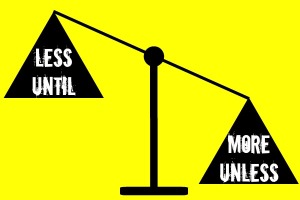 Have you ever noticed how many times the word ‘until’ gets used? Although not reserved for the office, it tends to crop up in staff meetings and with status updates. It also, usually, has ‘wait’ or ‘can’t’ as a prefix. Pay attention to how often you hear phrases similar to, “I can’t until …”
Have you ever noticed how many times the word ‘until’ gets used? Although not reserved for the office, it tends to crop up in staff meetings and with status updates. It also, usually, has ‘wait’ or ‘can’t’ as a prefix. Pay attention to how often you hear phrases similar to, “I can’t until …”
- I have more money.
- they get back from vacation.
- the kids finish school.
- the weekend.
- the end of the month.
- next year.
Granted, sometimes ‘until’ is a legitimate measure. You are not going to hang pictures on the wall until the paint dries. You’re not paying bonuses until the final results are in. You’re not going to Paris until you get your passport renewed. These are all valid reasons for inaction. However, leaders do not thrive with inaction.
- “I can’t talk to new clients yet, I have to wait until the new marketing brochures are printed.”
- “I can’t mentor him until the succession plan is finalized.”
- “I can’t launch until I get more feedback on the design.”
Phrase like that make a leader’s stomach turn. They clench, because it sounds like a stalling technique. Isn’t there a better, proactive way of communicating? Yes. First, replace the abdicating ‘can’t’, with an accountable ‘won’t’.
‘Won’t,’ tells the world you chose not to.
[Tweet “‘Won’t,’ tells the world you chose not to.”]
‘Won’t’ subtly forces you to own your decision, instead of hiding. Be action-minded in your daily speech and self-talk, and replace ‘until’ with ‘unless’.
I won’t unless;
- I make more money.
- they get back from vacation sooner.
- the kids finish school someplace else.
- something happens before the weekend, (the end of the month, next year).
Do things change when you no longer ‘can’t until’ and instead, ‘won’t unless’? The basic facts do not change. The condition surrounding them does. Your sense of ownership, accountability and power, increase. ‘Unless’ creates options; ’Until’ limits choice. Most people, whether they are aware of it or not, prefer to conceal themselves behind ‘can’t until’, thinking it absolves them of responsibility. Don’t allow that. Not in yourself, and not in the people you lead.
Maybe you want to try this method, but you can’t until your plate is less full, and you can focus clearly.
Maybe you can be a little more intellectually honest, and decide you won’t, unless your plate becomes clear first.
I’m okay with the latter, because with ‘won’t’ you’ve taken a stand, and with ‘unless’, you’ve created the condition. That’s good, because effective leaders know, current conditions can always change.
—
Karl Bimshas is an Executive Accountability Partner who helps new leaders and leaders in transition to meet their great goals. He’s the author of “How to Stay When You Want to Quit; Strategies to get over yourself“.